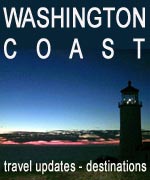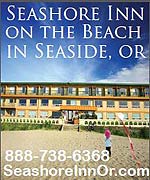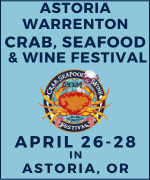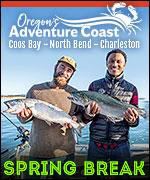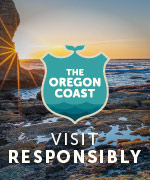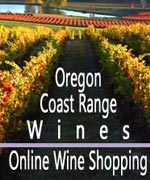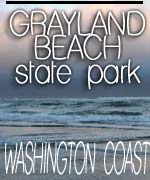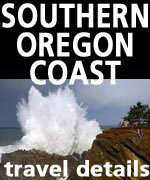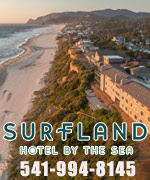Dune Novels, Movies Began with Frank Herbert's Visit to Oregon Coast Dunes, Florence
Published 2/19/24 at 3:15 p.m.
By Oregon Coast Beach Connection staff

(Florence, Oregon) - 1957, it turned out, was a watershed year for the literary world. A Northwest resident and young writer named Frank Herbert – who had spent considerable time in Tacoma and Salem – was wandering the dunes of the south central Oregon coast. Just outside Florence, the ever-curious reporter had become entranced by the movement of these large blobs of sand, describing them as “ like waves in a large body of water; they just are slower.” (Above: promo poster plus photo at right from Florence Visitor's Center)
Includes exclusive listings; some specials in winter
In Cannon Beach:
Includes rentals not listed anywhere else
In Manzanita, Wheeler, Rockaway Beach:
Some specials for winter
In Pacific City, Oceanside:
Some specials for winter
In Lincoln City:
Some specials for winter
In Depoe Bay, Gleneden Beach:
Some specials for winter
In Newport:
Look for some specials
In Waldport
Some specials for winter
In Yachats, Florence
Some specials for winter
Southern Oregon Coast Hotels / Lodgings
Reedsport to Brookings, places to stay; winter deals
Herbert had come to do an article on how the government was in the middle of what was then considered a successful program of stabilizing the sands of the Oregon National Dunes Recreation Area (but there's a plot twist there). That research captivated him like nothing else, and he compiled so much information that his article idea went by the wayside, instead resulting in a grand and gigantic idea: the Dune book series.
Now, with the release of Dune: Part Two, the sequel to the 2021 film, the book series' connection to the Oregon coast and Florence again gets a bit of the spotlight, and how it influenced one of the most anticipated films in a long time.
Dune: Part Two stars Timothée Chalamet, Zendaya, Josh Brolin and Rebecca Ferguson, and is out now in theaters and on streaming.
Much of it takes place on the planet Arrakis, a desert planet with gigantic worms and a lot more going on above and below the surface than it seems. Esoteric themes of spirituality abound alongside the ecological messages that were woven deep into the fabric of Herbert's run of books, with the latter something he obtained from his time at the Oregon coast dunes.
By the mid '50s, Herbert had lived in Tacoma, Washington, had graduated from what would later become known as North Salem High School, and been a reporter for Salem's Oregon Statesman (the precursor to the Statesman-Journal there) and with the Oregon Journal in Portland. He'd done a brief stint in the army during World War II, been married once, divorced, had a kid and had been in a long list of writing jobs, which included working for some politicians.
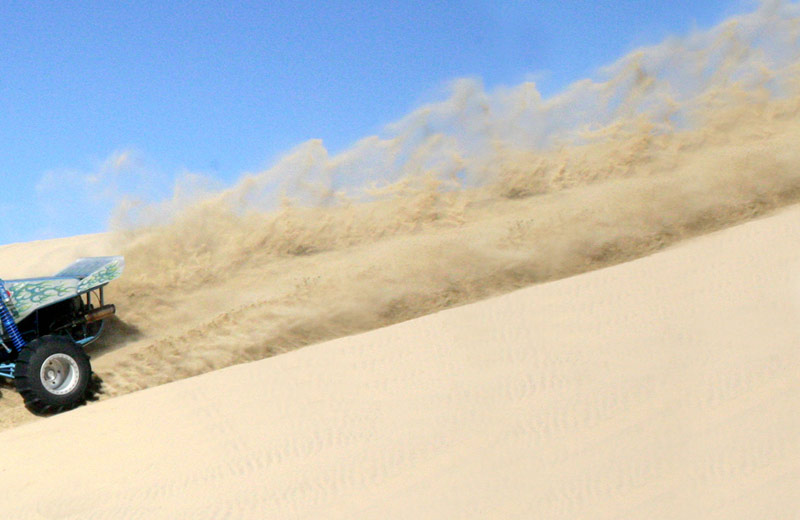
The dunes area near Coos Bay, courtesy Oregon's Adventure Coast
In '57, Herbert became interested in the work being done by the federal government on the dunes just south of Florence, where they planted European Beach Grass to slow the movement of those gigantic hills of sand, which were drifting across the highway and swallowing homes. It had been going on since the '20s, and Herbert said the US Department of Agriculture had been having considerable luck holding the sands down with this method.
As he told interviewer Willis E. McNelly in 1969, the work was copied by experts around the world. So, he came to Florence to check it all out and research an article.
As he told McNelly:
“And I got fascinated by sand dunes, because I’m always fascinated by the idea of something that is either seen in miniature and the can be expanded to the macrocosm or which, but for the difference in time, in the flow rate, and the entropy rate, is similar to other features which we wouldn’t think were similar. Like a river…”
Herbert chartered a plane and flew over the dunes. He wandered them quite frequently, took loads of photographs, and carefully studied the science of how they moved and why. This part of the Oregon coast drew him in deeper and deeper, and after his time here he continued studying dunes and sand, expanding his research obsessively to include larger deserts.
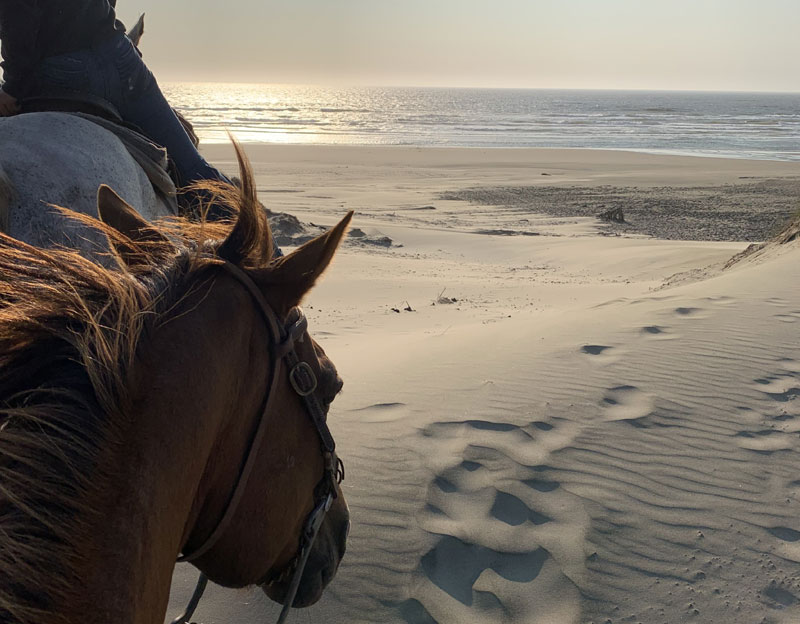
Florence, courtesy Florence Visitors Center
In the end, he acquired so much data – so many folders full of information – he had too much for any one article. Indeed, he had way too much for any short story fiction idea. He had already sold a few short stories and a not-so-successful novel by this time. Herbert found he was chasing lots of little avenues of research and ideas shooting off in various directions.
A couple of years later, his second wife, Bev, went to work so he could concentrate on writing full time. During this period, all that experience along the Oregon coast's dunes stewed inside him, inspiring the idea of a planet that was all sand: Arrakis. Dune was published in 1965.
This study of ecology and mankind's attempts to harness nature went into the expansive world he created, along with dozens of different (and often obscure) historical conflicts and ideologies. Like many great writers, Herbert was inspired by nature, something he'd spent a lot of time in growing up in Tacoma, as he went hiking and fishing in various areas of the Northwest.
Politically, he often leaned to the right but was firmly an environmentalist, warning in the '70s of impending disasters. He notes in the '69 interview that Dune itself depicts a world killing those who try to control it. Indeed, it's not hard to look at the vast, 40-mile stretch of the Oregon Dunes National Recreation Area and picture a gargantuan sand worm roving its way over the undulating shapes between Florence and Coos Bay.
In the McNelly interview, he bemoans heading to the Washington coast and finding a large container of plastic on the beach, noting how mankind is failing even in the '60s, creating these objects that simply float in the oceans and then litter the sands.
The sci-fi part of him probably would've been awe-struck by the area's propensity for strange, even mystical noises: the famed booming or singing sands. See the definitive guide to Oregon Coast Booming and Singing Sands (Oregon Coast Singing Sands to Booming, Squeaking Sands: How to and Where to Find ).
He died in '86. Yet Herbert would've been especially hearbroken then to find out in recent decades that those very sand stabilization processes along with other invasive grass species were dooming his favorite dunes. By holding the dunes down, they don't refresh and now experts predict the dunes could disappearance in 50 years. See Oregon National Dunes Area in Trouble
You can see Herbert's book collection at the Siuslaw Public Library in Florence.
Oregon Coast Hotels for this - South Coast Hotels - Where to eat - Florence Maps, Virtual Tours
Cannon Beach Lodging
Nehalem Bay Lodgings
Manzanita Hotels, Lodging
Three Capes Lodging
Pacific City Hotels, Lodging
Lincoln City Lodging
Depoe Bay Lodging
Newport Lodging
Waldport Lodging
Yachats Lodging
Oregon Coast Vacation Rentals
Oregon Coast Lodging Specials
More About Oregon Coast hotels, lodging.....
More About Oregon Coast Restaurants, Dining.....
 Andre' GW Hagestedt is editor, owner and primary photographer / videographer of Oregon Coast Beach Connection, an online publication that sees over 1 million pageviews per month. He is also author of several books about the coast.
Andre' GW Hagestedt is editor, owner and primary photographer / videographer of Oregon Coast Beach Connection, an online publication that sees over 1 million pageviews per month. He is also author of several books about the coast.
LATEST Related Oregon Coast Articles
This Week is Prime for Beachcombing on Oregon Coast: Fossils, Wrecks, Seashel...Nice weather plus recent storm waves equals cool finds
Nasty Little Green Crab and Its Attack on N. Oregon Coast's Netarts Bay
Nasty Little Green Crab and Its Attack on N. Oregon Coast's Netarts Bay - April 5 in Netarts and online will look at the effects. Oceanside events, Tillamook events, Rockaway Beach events
Central Oregon Coast's Beach, Bike 'n Blues Fest Resets Date to Sept 13
The day of Waldport events has moved again
Volunteers Needed for Garden Near Coos Bay: Help Out Oregon Coast Landmark at...
Inviting everyone to roll up their sleeves and join its Garden Volunteer Days. Coos Bay events, south coast events
Dark Sky Week is Prime Along Oregon Coast: Where and Where Not to Go
General guide to dark sky viewing from south to north coast. Astronomy
Famed Washed Ashore Project Will Be New Exhibit at Newport's Oregon Coast Aqu...
The unique exhibit of animals made from debris begins in May. Newport events, Lincoln City events
Oregon Astronomer: Why Easter Moves Around, April's Meteor Showers
Lyrid meteors, smallest moon of the year, and what's up with Easter. Sciences. south coast events, Florence events, Astoria events, Seaside events, Cannon Beach events, Manzanita events, Rockaway Beach events, Tillamook events, Garibaldi events, Oceanside events, Pacific City events, Lincoln City events, Depoe Bay events, Newport events, Waldport events, Newport events, Yachats events
World War II Radar Bunker at Cape Arago Near Coos Bay: Oregon Coast's Station...
South coast history takes a surprising twist
Back to Oregon Coast
Contact Advertise on Oregon Coast Beach Connection
All Content, unless otherwise attributed, copyright Oregon Coast Beach Connection. Unauthorized use or publication is not permitted





